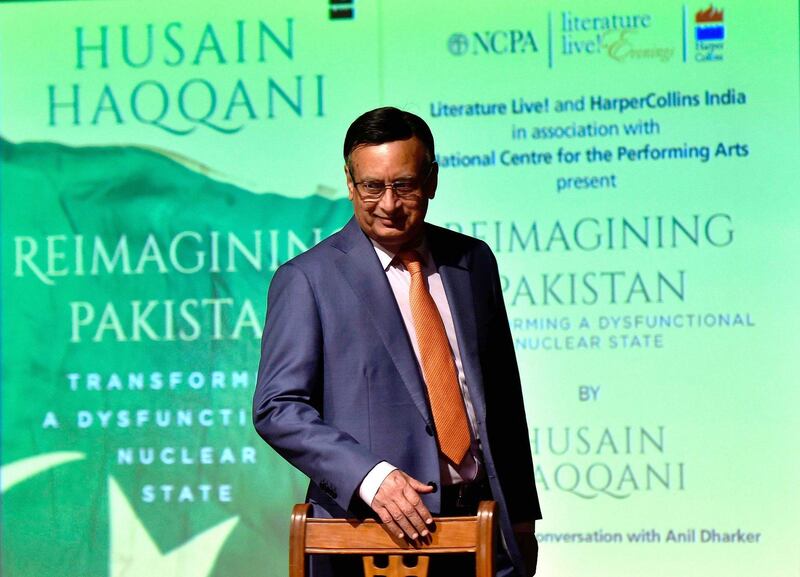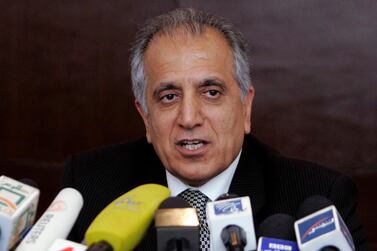The US-led effort to launch peace talks between Taliban insurgents and the Afghan government presents Pakistan with a chance to mend ties with Washington by playing a positive role and giving up a longstanding policy of trying to retain influence in Afghanistan, according to Husain Haqqani, a former Pakistani ambassador to the US.
The US, Afghanistan and India accuse Pakistan of supporting the Taliban and providing refuge to its leaders, a charge Islamabad denies. Washington last year began direct talks with the Taliban, seeking to negotiate an end to its 17-year insurgency following the US-led invasion of 2011 in pursuit of Al Qaeda leader Osama bin Laden.
"For Pakistan, the US focus on withdrawal from Afghanistan offers an opportunity to engage with Washington and to possibly secure US economic and military assistance," Mr Haqqani said in an interview with the The National during a visit to India to speak on security in South Asia at the Jaipur Literature Festival last month.
The top US negotiator with the Taliban, Zalmay Khalilzad, said last week that a draft deal had been agreed under which American forces would withdraw from Afghanistan in exchange for a ceasefire, the beginning of intra-Afghan talks and a guarantee that the country would not become a haven for terrorists.
Pakistani intervention could help clinch a deal, but only up to a point, according to Mr Haqqani, now a senior fellow and director for South and Central Asia at the Hudson Institute think tank in Washington.
“There remains a huge perceptual gap between the US and the Taliban," he said. "I doubt that Pakistan can help overcome the chasm between America’s and the Taliban’s world views.”
He said Pakistan’s refusal to admit to influence over the Taliban could put it in a difficult spot. “The world sees the Taliban as Pakistan’s protege, and having a protege you cannot fully control makes things complicated. My fear in relation to the US and Pakistan is that both sides could overestimate their respective leverage – the US over the [Pakistani] economy and Pakistan over an Afghan settlement – making a deal more difficult,” he said.
The former diplomat also raised concerns over Pakistan’s intentions in the peace negotiations. “The Pakistan establishment’s desired end game in Afghanistan has unfortunately not changed since the 1970s. Instead of befriending any legitimately elected government in Kabul, Rawalpindi still desires an Islamist Pashtun, pro-Pakistan, anti-Indian Afghan government,” he said, referring to the city where Pakistan's army has its headquarters.
“The Taliban and Pakistan have given assurances about clearing out international terrorists several times since 1996, and their promises have often turned out to be inadequate or outright false. If there is to be a settlement this time, it would have to involve verifiable guarantees that Afghan and Pakistani soil will not be used to harbour or train terrorists responsible for attacks anywhere. If Pakistan is helping move things in that direction, that is a positive development,” he said.
Mr Haqqani said support for the peace initiative from various countries was as a positive step.
“Pakistan has been encouraged to bring the Taliban to the table by friends, such as Saudi Arabia and the UAE, who were concerned about Pakistan’s increasing isolation under American pressure. Thus, Pakistan’s positive role owes a lot to the positive role of countries and world leaders who want to help Pakistan and want it to give up past policies,” he said.
However, Pakistan’s persistent role in Afghanistan's wars has caused widespread bitterness among Afghans, even though it provided refuge to hundreds of thousands of refugees during the worst of the fighting, Mr Haqqani said.
“After the Soviet withdrawal from Afghanistan, Pakistan has insisted on deciding who can govern Afghanistan, saying that Kabul must have a pro-Pakistan government. Pakistan supported Gulbuddin Hekmatyar, who bombed Kabul and destroyed the city while trying to control it. Then it backed the Taliban,” he said.
“Afghans recognise that Pakistan welcomed Afghan refugees during the 1970s and 1980s, but they would also state that Pakistan used the refugee camps and madrassas for the foot soldiers who supplied the mujahideen groups and later the Taliban.”
Mr Haqqani said it was important that Pakistan won back the hearts of the Afghan people “by respecting their leaders instead of trying to pick and choose who should lead Afghanistan”.






